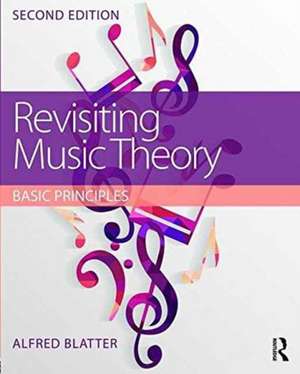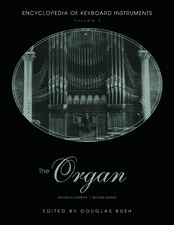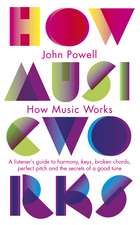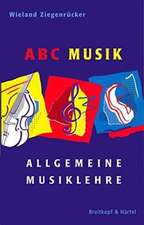Revisiting Music Theory: Basic Principles
Autor Alfred Blatteren Limba Engleză Paperback – 20 dec 2016
The text covers the basic principles of music theory, including:
• Musical notation
• Key signatures and scales
• Intervals, chords, and progressions
• Melodic and harmonic analysis
• Counterpoint and voice leading techniques
• Musical forms and structures
This second edition has been revised and reorganized to promote learning. Each section now includes an all-new selection of exercises, allowing readers to practice key skills and improve understanding.
For students, instructors, and practicing musicians, Revisiting Music Theory offers an indispensable guide to the foundations of musical analysis.
| Toate formatele și edițiile | Preț | Express |
|---|---|---|
| Paperback (1) | 472.65 lei 6-8 săpt. | |
| Taylor & Francis – 20 dec 2016 | 472.65 lei 6-8 săpt. | |
| Hardback (1) | 1130.47 lei 6-8 săpt. | |
| Taylor & Francis – 28 dec 2016 | 1130.47 lei 6-8 săpt. |
Preț: 472.65 lei
Nou
Puncte Express: 709
Preț estimativ în valută:
90.45€ • 95.11$ • 74.73£
90.45€ • 95.11$ • 74.73£
Carte tipărită la comandă
Livrare economică 16-30 aprilie
Preluare comenzi: 021 569.72.76
Specificații
ISBN-13: 9781138915893
ISBN-10: 1138915890
Pagini: 426
Ilustrații: 570
Dimensiuni: 203 x 254 x 30 mm
Greutate: 0.84 kg
Ediția:Revised
Editura: Taylor & Francis
Colecția Routledge
Locul publicării:Oxford, United Kingdom
ISBN-10: 1138915890
Pagini: 426
Ilustrații: 570
Dimensiuni: 203 x 254 x 30 mm
Greutate: 0.84 kg
Ediția:Revised
Editura: Taylor & Francis
Colecția Routledge
Locul publicării:Oxford, United Kingdom
Cuprins
Preface
Acknowledgments
Notes on the Use of This Book
Part 1. Notation: The Symbols of Music
1. The Components of Sound and Music
2. The Notation of Pitch
3. The Notation of Duration
4. The Organization of Time
5. Movement, Language, and Musical Rhythms
6. The Notation of Loudness and Style
7. The Notation of Tone Quality
8. Conducting Music
Part 2. Melody: Note Following Note
1. Intervals
2. The Modes
3. The Major Scale
4. Key Signatures for Major Scales
5. The Minor Scales
60 Other Minor Scales
7. Key Signatures for Minor Keys
8. Scale Degrees
9. The Melodic Structure
10. Expanded Melodic Sources
Part 3. Harmony: Note(s) with Note(s)
1. Intervals
2. Triads
3. The Inversion of Triads
4. Triads within Key
5. Seventh Chords
6. Harmonic Progressions
7. Harmonic Rhythm
8. Cadences
9. Secondary Dominants
10. More Chords on the Secondary Level
11. Other Chords
Part 4. Melodies in Harmony
1. Part Writing
2. Creating the Harmonic Structure
3. Non-Harmonic Tones
4. Analyzing Later Styles
5. Nineteenth-Century Analysis
Part 5. Texture, Structures, Techniques, and Form
1. The Textures of Music
2. Fundamental Structures
3. Melodic Manipulation
4. Form
Part 6. Appendices
Appendix I. Systems for Identifying Pitch
Appendix II. The Harmonic Series
Appendix III. Tuning and Temperament
Appendix IV. The Circle of Fifths
Appendix V. Transposition
Appendix VI. All Major Scales in Four Clefs
Appendix VII. All Minor Scales in Four Clefs
Appendix VIII. Inversions of All Triads on All Pitches in Two Clefs
Appendix IX. Inversions of All Common Seventh Chords on All Pitches in Two Clefs
Appendix X. Primary Chords in All Major and Minor Keys in Two Clefs
Appendix XI. Chord Symbols Used in Lead Sheet and Fake Book Notation in Two Clefs
Acknowledgments
Notes on the Use of This Book
Part 1. Notation: The Symbols of Music
1. The Components of Sound and Music
2. The Notation of Pitch
3. The Notation of Duration
4. The Organization of Time
5. Movement, Language, and Musical Rhythms
6. The Notation of Loudness and Style
7. The Notation of Tone Quality
8. Conducting Music
Part 2. Melody: Note Following Note
1. Intervals
2. The Modes
3. The Major Scale
4. Key Signatures for Major Scales
5. The Minor Scales
60 Other Minor Scales
7. Key Signatures for Minor Keys
8. Scale Degrees
9. The Melodic Structure
10. Expanded Melodic Sources
Part 3. Harmony: Note(s) with Note(s)
1. Intervals
2. Triads
3. The Inversion of Triads
4. Triads within Key
5. Seventh Chords
6. Harmonic Progressions
7. Harmonic Rhythm
8. Cadences
9. Secondary Dominants
10. More Chords on the Secondary Level
11. Other Chords
Part 4. Melodies in Harmony
1. Part Writing
2. Creating the Harmonic Structure
3. Non-Harmonic Tones
4. Analyzing Later Styles
5. Nineteenth-Century Analysis
Part 5. Texture, Structures, Techniques, and Form
1. The Textures of Music
2. Fundamental Structures
3. Melodic Manipulation
4. Form
Part 6. Appendices
Appendix I. Systems for Identifying Pitch
Appendix II. The Harmonic Series
Appendix III. Tuning and Temperament
Appendix IV. The Circle of Fifths
Appendix V. Transposition
Appendix VI. All Major Scales in Four Clefs
Appendix VII. All Minor Scales in Four Clefs
Appendix VIII. Inversions of All Triads on All Pitches in Two Clefs
Appendix IX. Inversions of All Common Seventh Chords on All Pitches in Two Clefs
Appendix X. Primary Chords in All Major and Minor Keys in Two Clefs
Appendix XI. Chord Symbols Used in Lead Sheet and Fake Book Notation in Two Clefs
Descriere
Revisiting Music Theory: Basic Principles, Second Edition, surveys the basics of music theory and explains the terms used in harmonic and formal analysis in a clear and concise manner. Students will find Revisiting Music Theory to be an essential resource for review or reference, while instructors of introductory theory courses will find in these pages a solid foundation for cultivating musical thinking. Musicians of all kinds—amateur and professional alike—will find great value in augmenting and informing their knowledge of the art of music theory.
The text covers the basic principles of music theory, including:
• Musical notation
• Key signatures and scales
• Intervals, chords, and progressions
• Melodic and harmonic analysis
• Counterpoint and voice leading techniques
• Musical forms and structures
This second edition has been revised and reorganized to promote learning. Each section now includes an all-new selection of exercises, allowing readers to practice key skills and improve understanding.
For students, instructors, and practicing musicians, Revisiting Music Theory offers an indispensable guide to the foundations of musical analysis.
The text covers the basic principles of music theory, including:
• Musical notation
• Key signatures and scales
• Intervals, chords, and progressions
• Melodic and harmonic analysis
• Counterpoint and voice leading techniques
• Musical forms and structures
This second edition has been revised and reorganized to promote learning. Each section now includes an all-new selection of exercises, allowing readers to practice key skills and improve understanding.
For students, instructors, and practicing musicians, Revisiting Music Theory offers an indispensable guide to the foundations of musical analysis.










